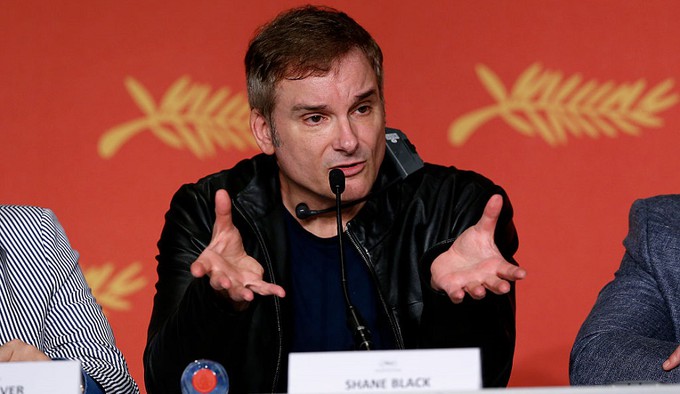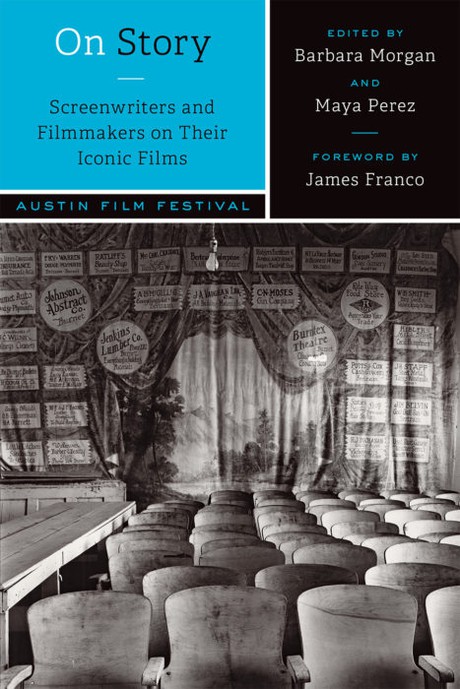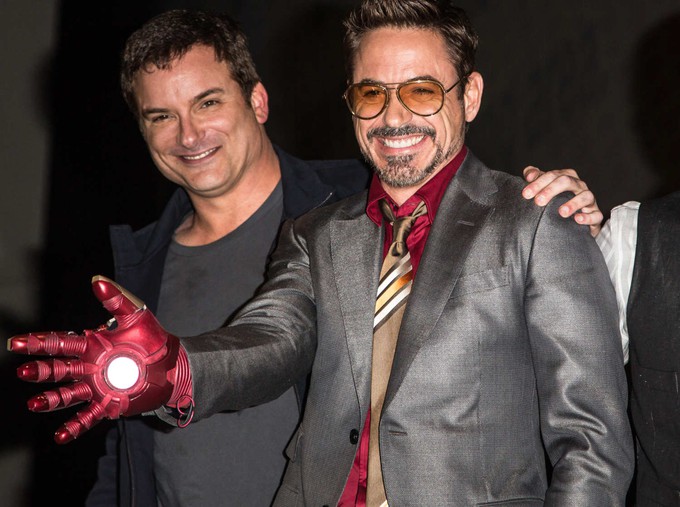Ahoy, squirts! Quint here. You don't pass up a chance to talk with Shane Black. That's, like, rule 393 in the unwritten movie writer's handbook. Especially when that talk is going to be focused on him sharing his writing expertise with you.
I only got 10 short minutes with Shane over the phone, but we managed to cover a few interesting things related to his approach to writing, including his thoughts on creating iconic characters, how the process works when you're writing with a partner versus writing alone and what mistakes he sees young screenwriters making.
All of this was to promote a book that Austin Film Festival is putting out called On Story, which has many transcripts of their great guests giving talks over the years. Black has been an AFF vet for decades and is a big part of the book. You can order that book here if you like to read smart people saying smart things in entertaining ways!
So here's a short chat with one of the best screenwriters of our time about his craft. Enjoy!

Quint: Your primary input on this book, On Writing, comes from a panel you did on creating memorable characters.
Shane Black: Yeah, with (David) Milch and (Sydney) Pollack.
Quint: It's a great read. I'd like to start there, since you're very well known for creating these larger than life characters that somehow don't feel absurd, if that makes any sense. Is there a secret to your ability to pull that off?

Shane Black: If you're trying to create a mythic or iconic character the key is always, I think, grounding it and giving as much detail to it as possible. The characters that live vividly in the world of pulp... for instance, if you go back to Sherlock Holmes you'll realize the reason people want to live in Sherlock Holmes' world, if you read Doyle, has less to do with solving mysteries and more to do with the wonderful life of being that bachelor who is a slightly crazed, violent, pistol-practicing and occasionally cocaine-indulging guy. Everyone wanted to be the Watson, but never had a place to go hang out with him.
So, the idea of creating characters you just want to hang out with, although it seems a bit banal as a concept, I think holds some water. Grounding even the most mythic or iconic characters in something that's a vulnerability or wondering what someone's hiding can be just as important as watching them put on their mask that they present to the world.
I think it was Robert Towne who said something to the extent that you want to start by asking what your character is afraid of and what their mood is. There's all kinds of tricks of grounding and making a more realistic character. Certainly there are tendencies to make them interesting, which have to do with making someone you can not necessarily be, but wish you could. I certainly think your character should be good at what they do. They should be very good at exploiting that, in a very sort of layman terms way. I think they should have a sense of humor about themselves and, I think, a touch of outrage as well. Something outward they're not quite saying, but really enflames them.
Quint: Something else you're very talented at doing is not only building up strong individual characters, but making different interesting personality types bounce off each other. How much of that character interaction is tough for you to nail or is it all about building them up as individuals and then letting them loose on the page and seeing what happens?
Shane Black: I think there's something to be said with what you just said, letting them loose and watching them collide. If you have a firm idea of what the characters are then there'll be a moment where it just clicks, where you get a sense of the dynamic and it just becomes natural to gravitate your mind to the sorts of things they would talk about and feel the most about. The arguments that don't happen could be the most telling arguments. Or the moments they'll share that'll be the most conspicuously bonding for them.
We all have these different characters in our heads. If you write a story about an older curmudgeon who is arguing with an impetuous young kid, to the extent that you're able to do that well, inside your head there are those two parts of you, so it's really like therapy. Maybe there's a part of you that's more traditional and conservative and you try to imagine what it'd be like to be less that and make a case for it in your head.
Quint: You very famously carved a unique path to getting your work noticed. I see a lot of young writers in scripts I've read try to emulate your style of talking directly to the reader. Do you view that as a mistake for young writers to try to follow you down that path to success or do you think that's a good way for them to differentiate themselves from the rest?
Shane Black: You should learn to walk before you fly. You can't impose a style just to say you've done it. I took it, to some extent, from William Goldman and Walter Hill because it seemed organic to me. It seemed congruent with all the books that I'd read. I'm familiar with the novelistic way of presenting material.
It's hard to say on the page “He walks to the cabinet and extracts a bottle of liquor.” You want to play. Here's the problem: if you're going to play, do it well. You can't just template it and impose this kind of style. Make sure you know what you're doing. If you make jokes they're funny jokes. It's a good idea, but it is a risky and tricky proposition. You could well end up looking like someone who's overreaching and just trying to be precious.
Quint: What do you feel is the toughest hurdle for a writer to overcome when starting out these days? This is getting dangerously close to the very boring “What's your advice to young screenwriters” question, but since you interact with a lot of aspiring writers I'm curious what mistakes you see them making.
Shane Black: I see young screenwriters showing up to Hollywood or sending off to contests with one script and a bunch of ideas, or, too often unfortunately, just a bunch of ideas. You gotta have product and you gotta have your best work. Making your work good before trying to be a superstar is essential and the time it takes is the time it takes to really hone and perfect the work.</>
In doing that you need to surround yourself with people. I think the other mistake is to be lonely. So many screenwriters don't have a group in which they can function, who shares their views and reads their pages and critiques each others work. I think that's essential. You have to be a part of a community and help each other out. That'll get you through the other hassle, the other hurdle, which is breaking in because you have more ammunition; you have friends all trying to do the same thing.
So, don't be lonely, make the work good and have three examples before you even set foot in Hollywood.
Quint: You've written both solo and with collaborators. Recently you've returned to collaborating with Fred Dekker who you started out with on Monster Squad and are now doing Predator together. Can you talk a little about the pros and cons of working with a collaborator versus going it largely alone?
Shane Black: If you can find the right partner it's all pros. They compliment you in ways that you're weak and you compliment them. You're able to commiserate, you're able to kickstart something that if it was just solely in your own head you'd be walking around the block moping, but with another person to bounce off of it's so much easier. You're able to break story quicker and get to the point where you start to commit things to index cards in a lot quicker fashion than if you were just going in yourself.
But it's important that you get a good partner. If you have someone who you're contentious with, whose views don't match yours, you're not going to be arriving at conclusions. You're going to be jousting with each other over whose view over the material is preeminent. So, just get someone who wants to make the same movie as you, but has slightly different ideas and attack it together and break the story.

And that was my all too brief chat with Mr. Black. Lots of great little nuggets in there, especially for aspiring writers. Take his words to heart, young ones!
-Eric Vespe
”Quint”
quint@aintitcool.com
Follow Me On Twitter

